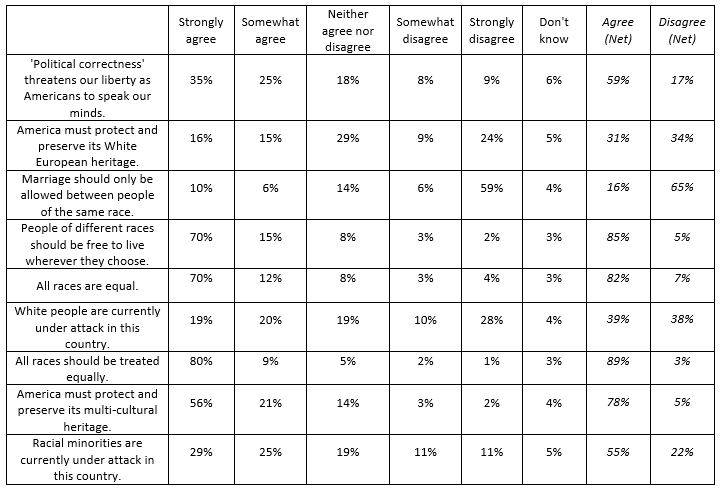
Source: Center for Politics. (Click for more legible image.)
The University of Virginia’s Center for Politics has just published the results of a poll on Civil War statues and race. To my mind, the questions about the Civil War statues are the least interesting. Nationally, Americans say by a two-to-one margin to leave the statues alone, which tells us nothing that previous polls haven’t revealed. More interesting is the spin that the Center put on the answers to its questions about attitudes towards race.
While few Americans surveyed expressed direct support for hate groups like the KKK, Nazis and Antifa, stated the press release accompanying the poll, “it will be disturbing to many that a not insubstantial proportion of those polled demonstrated neutrality and indifference or, worse, expressed support for antiquated views on race.”
Large numbers agreed with the statement that “white people are under attack,” and disagreed that “nonwhites are under attack,” while a third of respondents agreed that the country needs to “protect and preserve its White European heritage.” Then the press release said this (the emphasis is the Center’s):
Fifty years after the United States Supreme Court struck down bans on mixed-race marriage in Loving v. Virginia, about one-sixth of respondents (16%) agreed with the statement that “marriage should only be allowed between two people of the same race” and an additional 14% neither agreed nor disagreed with the statement, while 4% said they didn’t know. In total, about a third failed to express tolerance of interracial marriage. Among whites, 17% agreed that marriage should be restricted to the same race, with 15% neither agreeing nor disagreeing. This was slightly higher than nonwhites (15% agreed, 12% neither agreed nor disagreed).
Moreover, it appears that those Nazis and Klansmen marching in Charlottesville (and perhaps this weekend in Richmond) have lots of closet sympathizers. Six percent of the 5,360 people polled said they strongly or somewhat supported the “alt-right,” another 8% white nationalism, and another 4% neo-Nazism.
Let’s deconstruct this analysis. First, it should be reassuring that despite the surge of identity politics in the nation, 80% of Americans said they “strongly agree” and 9% said they “somewhat agree” with the question that “all races should be treated equally.” I do find it disturbing that 11% disagree with this fundamental proposition or simply aren’t sure about it. I would like to know who those people are. Many would jump to the conclusion that anyone expressing retrograde sentiments must be racist whites. But the Center’s crosstabs don’t support that conclusion.
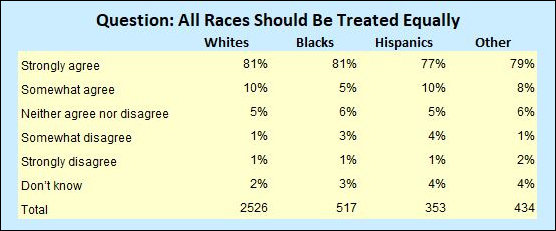
Whites are more likely to agree than other groups with the proposition that all races should be treated equally.
A related question is whether “all races are equal.”
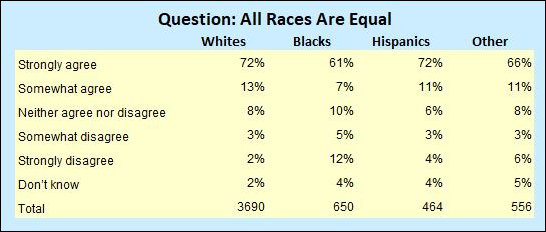
Whites agree with the statement by a significantly larger margin than blacks — 85% to 68%. But what does that mean? If someone one disagrees, does that mean he or she is an old-style racist who believes in black inferiority? Does it mean that the respondent does not believe the races are treated equally? Or does it mean something else entirely? Given the ambiguity of the question, it is almost worthless.
How about the question that “America must protect and preserve its White European heritage?”
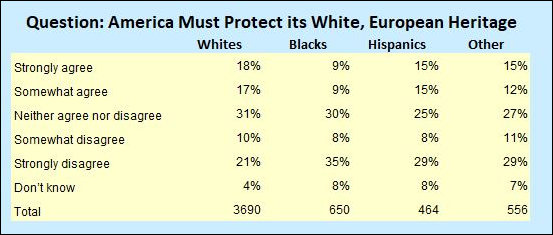
The tenor of the question invokes Klan and neo-Nazi rhetoric that Americans of European descent are oppressed… or whatever it is they whine about. But the question lends itself to a white variety of interpretations, as should be made clear by the fact that almost as Hispanics and Others (a group consisting primarily of Asians) agreed with the statement as did whites. I would conjecture that many who answered in the positive interpreted the question to mean that America must protect its “Western European heritage,” including everything from Christianity and the spirit of inquiry to democracy, free markets, human rights and the rule of law. Indeed, had I been asked, that how I might have interpreted it.
I won’t bother to display the results of the question of whites and nonwhites being “under attack.” Are we talking about being physically under attack, as in police assaults on innocent African-Americans, or rhetorically under attack, as in verbal assaults on “white privilege”? Are blacks “under attack” if they are not enrolled in college in the same percentages as whites and Asians? Conversely, are whites “under attack” if colleges set quotas to ensure minority participation? There are so many ways to interpret the question that the results are meaningless.
Now let’s address the question of racial intermarriage.
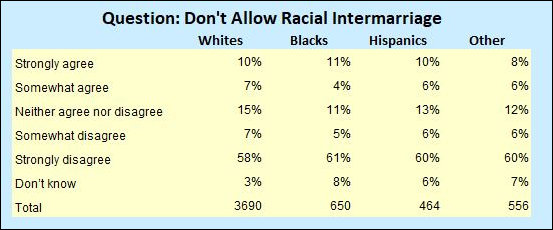
By a small margin, a higher percentage of whites than blacks, Hispanics and Others agree that “marriage should be allowed only between people of the same race.” But again, this is an ambiguous question. Does roughly one-sixth of the population support a return of miscegenation laws, as the Center’s press release implies by invoking Loving vs. Virginia? Or do some people oppose intermarriage personally — as in, they would rule it out for themselves or their children? And if they do personally oppose intermarriage, what is the reason? Do they harbor bigoted feelings towards members of other races? Are they concerned about preserving their cultural heritage and pride of ancestry? Or could they have some other reason altogether?
Lastly, we get to a series of questions asking whether people “support or oppose” various labels such as the “alt-right,” “white nationalism,” and “neo-Nazism.” Disturbingly, some 4% to 8% of whites express support for these movements. But in almost every case, even greater percentages of blacks, Hispanics and Others support them. Perhaps the press release headline should say, “Blacks support neo-Nazi movement by twice the margin as whites!”
What can we possibly make of such findings? They are not a fluke, incidentally, for they have surfaced in other polls? I don’t know the answer, but I suggest that attitudes toward race relations are far more complex than is acknowledged by those who designed the Center for Politics questionnaire.


